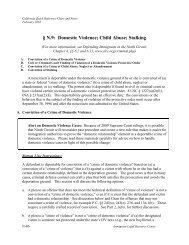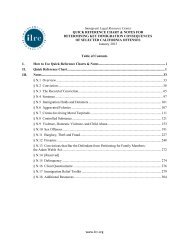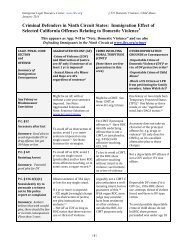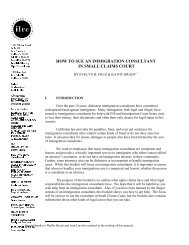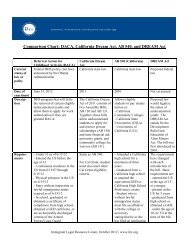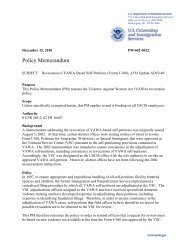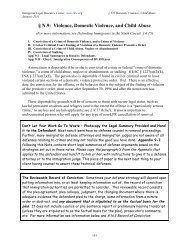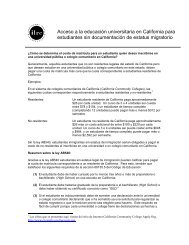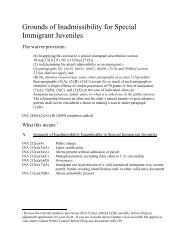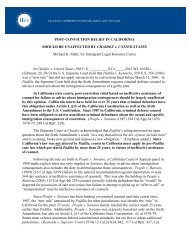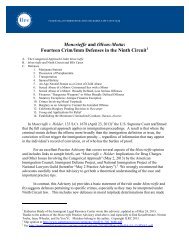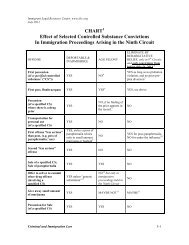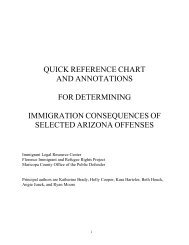quick reference chart and notes for determining immigration - ILRC
quick reference chart and notes for determining immigration - ILRC
quick reference chart and notes for determining immigration - ILRC
Create successful ePaper yourself
Turn your PDF publications into a flip-book with our unique Google optimized e-Paper software.
Cali<strong>for</strong>nia Quick Reference Chart <strong>and</strong> Notes<br />
February 2010<br />
Trevino permits this only if the statute is divisible, <strong>and</strong> if the reviewable record of conviction<br />
does not establish whether the offense involves moral turpitude. To attempt to protect the<br />
defendant from a broad inquiry, criminal defense counsel should plead specifically to conduct<br />
under the statute that does not involve moral turpitude, <strong>and</strong> put this in the reviewable record of<br />
conviction. For example, counsel should arrange a guilty plea to a temporary taking under Veh.<br />
Code § 10851, or a mere offensive touching under P.C. § 243(e). See discussion of crimes<br />
involving moral turpitude in Note 7, supra.<br />
Give the above summary to the defendant if you were successful in creating a specific record<br />
of a plea to an offense that does not involve moral turpitude, under a divisible statute. See<br />
discussion of offenses in the Chart <strong>and</strong> Notes to see what conduct that is covered by various<br />
offenses does not involve moral turpitude.<br />
As the below box states, even if an <strong>immigration</strong> judge may go beyond the record of<br />
conviction to determine if the offense of conviction is a crime involving moral turpitude, they<br />
may not do this to determine if it comes within other <strong>immigration</strong> provisions, e.g. is a deportable<br />
conviction of a firearms offense, a controlled substance offense.<br />
For the Defendant: Silva-Trevino applies only to the moral turpitude grounds <strong>and</strong> does not<br />
permit an inquiry beyond the categorical approach to determine whether an offense comes within<br />
any other ground of inadmissibility or deportability. “This opinion does not, of course, extend<br />
beyond the moral turpitude issue--an issue that justifies a departure from the Taylor/Shepard<br />
framework because moral turpitude is a non-element aggravating factor that ‘st<strong>and</strong>s apart from<br />
the elements of the [underlying criminal] offense.’” Matter of Silva-Trevino, 24 I&N Dec. 687,<br />
699, 704 (AG 2008).<br />
I. Find a Disposition That Is Not a Conviction<br />
Most, although not all, <strong>immigration</strong> consequences can be avoided if the offense is not a<br />
“conviction.” See discussion in § N.3, supra.<br />
For the Defendant: The following is not a “conviction” <strong>for</strong> <strong>immigration</strong> purposes in<br />
proceedings arising in the Ninth Circuit.<br />
A first conviction <strong>for</strong> simple possession (felony or misdemeanor) that is eliminated under<br />
rehabilitative provisions such as Deferred Entry of Judgment, Prop 36, or PC § 1203.4 is<br />
eliminated <strong>for</strong> all <strong>immigration</strong> purposes. Lujan-Armendariz v. INS, 222 F.3d 728 (9 th Cir. 2000).<br />
This also works if the first conviction is <strong>for</strong> an offense less serious than simple possession that<br />
does not have a federal analogue, such as possessing paraphernalia or under the influence<br />
(Cardenas-Uriarte v. INS, 227 F.3d 1132 (9 th Cir. 2000), Ramirez-Altamirano v. Mukasey, 554<br />
F.3d 786 (9th Cir. 2009) (Calif. H&S C § 11364(a)) <strong>and</strong> should work <strong>for</strong> a first conviction <strong>for</strong><br />
giving away a small amount of marijuana <strong>for</strong> free (see 21 USC § 841(b)(4)).<br />
N-142 Immigrant Legal Resource Center



